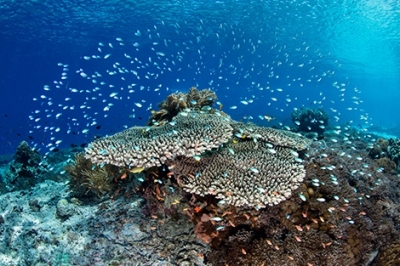
Over the last few years, you may have come across several news reports on how coral reefs the world over are suffering. Come, let’s find out what affects these coral reefs, and how this has an impact on humans too.
What are coral reefs?
Corals are marine invertebrates living in colonies. They take calcium carbonate from the seawater and make hard exoskeletons to protect their “soft, sac-like bodies”. They use the exoskeleton of their ancestors while adding new layers to it. So, over a period of time as the new layers keep getting added, it forms large underwater structures called coral reefs. Each individual coral is referred to as a polyp. Most corals have a symbiotic relationship with an algae called zooxanthellae. They live in the coral polyp’s body, and through photosynthesis, provide energy for themselves and the polyp. They also give corals their spectacular colours. Without these algae, the corals are colourless.
What is killing the coral reefs?
Coral reefs are found in all the oceans. When ocean waters warm, the corals expel the algae and return to their colourless selves. This is called coral bleaching. If oceans keep warming, the corals will not allow the algae to return, and will eventually die. A recent study by the Global Coral Reef Monitoring Network, a United Nations supported global data network, said the world’s coral reefs will disappear if oceans keep warming. Coral reefs are important to several marine creatures because they provide shelter, are spawning grounds, and offer them protection from predators. So, when coral reefs die, it affects several living organisms. Not just that, they have a bearing on humans too.
Impact on humans
As natural barriers, coral reefs take the impact of waves and storm surges, and help coastal communities stay safe. Further, when coral reefs die, they cannot support marine organisms anymore, so many of those species die too. These include a variety of fish, crabs, shrimps, etc., which are consumed by humans. While the livelihoods of fishing communities are affected by the lack of such sea food, people consuming these are forced to look for other food options, which could cause an imbalance in food sources. Another important aspect is tourism. Tourism brings in plenty of money and supports several jobs directly and indirectly related to the reefs. When the reefs go, so will tourists and the money they bring in.
Picture Credit : Google




